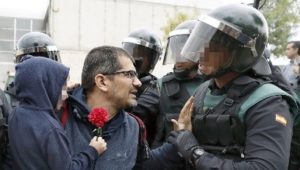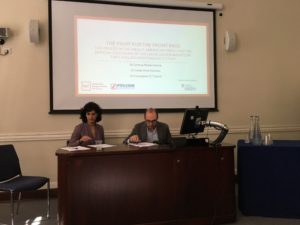Harry Churchill reports on the ‘Mediating the Catalan Independence Movement’ symposium held at IMLR, Senate House, London in September 2018
A symposium on mediating the crisis in Catalonia was held from 12th to 13th of September 2018 in the Senate House, Malet Street, London WC1E 7HU. It was organised by The Centre for Catalan Studies, Queen Mary and CILAVS, Birkbeck in collaboration with the Institute of Modern Languages Research, all of which are part of the University of London. The event was also supported by the Institut Ramon Llull which promotes Catalan language and culture internationally.
The event was well-attended, drawing a mixture of senior academics, students and members of the public. John London (Queen Mary) and Mari Paz Balibrea (Birkbeck) set the scene for the symposium during the introductory address. They both stated that they felt the aim of the conference was to contribute to the discussion on Catalan independence using insight from their own disciplines. John London cited examples of ignorance in the British mainstream media to highlight the lack of understanding surrounding the call for self-rule in Catalonia.
 The conference proceeded with a discussion about social media during the campaign for independence in Catalonia. Gabriela Viadero-Carral (Universidad Complutense de Madrid) began by outlining the contrasting positions of the ‘right-wing politicians’ and the ‘independentistas’ on social networks and explained that each side would use the same videos and pictures in an attempt to secure support. In one example, she displayed an image that went viral in Spain, of a Catalan man and his son presenting a member of the Guardia Civil with a flower. This was used to demonstrate how each side manipulated the image for political gain.
The conference proceeded with a discussion about social media during the campaign for independence in Catalonia. Gabriela Viadero-Carral (Universidad Complutense de Madrid) began by outlining the contrasting positions of the ‘right-wing politicians’ and the ‘independentistas’ on social networks and explained that each side would use the same videos and pictures in an attempt to secure support. In one example, she displayed an image that went viral in Spain, of a Catalan man and his son presenting a member of the Guardia Civil with a flower. This was used to demonstrate how each side manipulated the image for political gain.
Amanda Iveson (Roehampton) discussed twitter and the online construction of moral and symbolic boundaries in the Catalan independence process. She spoke of the emergence of an ‘us-them dichotomy’ and stated that, according to her research, social media provides a platform for enhanced feelings of nationalism. The chair Dominic Keown (Cambridge) then opened to the floor to questions and comments.
The second day dealt with humour and the press. Núria Bonet (Plymouth), discussed the humour surrounding the chants and songs of the pro-separatists up until the referendum was held. She contended that after the referendum, humorous songs such as ‘on estan les paperetes’ (where are the ballot papers?) and ‘Passi-ho bé’ (bye bye) disappeared when the severity of the situation in Catalonia was realised and that these songs were then replaced by more traditional ones from the Civil war and Franco eras.
This was succeeded by an analysis of the Catalan independence process in the Anglo-American press by Cristina Perales-García and Carles Pont (Universitat Pompeu Fabra). They analysed the Washington Post, the New York Times, the Guardian, and the Daily Telegraph as well as press releases from the White House and Downing Street. Their research broke down the sources used by each newspaper and carried out a content and ethnographic analysis. They also revealed an inconsistency in response to the crisis between the Obama and Trump administrations and showed that the British position continued to be heavily influenced by the Scottish campaign for independence. Their research concluded that the international press presented the Catalan conflict with a higher degree of impartiality than the Spanish and Catalan press.
an analysis of the Catalan independence process in the Anglo-American press by Cristina Perales-García and Carles Pont (Universitat Pompeu Fabra). They analysed the Washington Post, the New York Times, the Guardian, and the Daily Telegraph as well as press releases from the White House and Downing Street. Their research broke down the sources used by each newspaper and carried out a content and ethnographic analysis. They also revealed an inconsistency in response to the crisis between the Obama and Trump administrations and showed that the British position continued to be heavily influenced by the Scottish campaign for independence. Their research concluded that the international press presented the Catalan conflict with a higher degree of impartiality than the Spanish and Catalan press.
The day was ended by a round table discussion involving Guillem Colom Montero (Exeter), Dominic Keown, Uta Staiger (University College London), with John London and Mari Paz Balibrea as chairs. Colom-Montero started by reflecting on the cultural shifts triggered by the pro-independence movement, with a focus on how the politics of Catalan cultural normalisation may be undergoing a process of transformation, which Colom-Montero connected to the recent socio-political changes unfolding in Catalonia since June 2010. To show this, he discussed the recently-launched TV3 programmes Preguntes freqüents and Katalonski. Colom-Montero concluded that, from his point of view, the nationalist elements of cultural normalisation have seen a decline in recent years owing to the new discourses circulated by the Catalan independence movement. Keown reflected on the loss of semantic accuracy in the unity/independence debate in Spain and how this, together with the absence of concrete ideological, economic and social analysis, was reminiscent of the vagueness of contemporary political discourse in the UK (Brexit) and USA (presidential election, 2016). Staiger discussed how media representation on either side tends to appeal to ‘the will of the people’ in order to support, or undermine, the legitimacy of calls for Catalan independence. Deriving from Jean-Jacques Rousseau, the concept suggests that there is a single will of a unified citizen body, and that government policy needs to express that will – if needs be, without approval of parliament or the courts. It is thus too often called upon – be it in Catalonia, Spain, or Brexit Britain – to suppress the scale of dissent about a political choice, and ultimately cast dissenters as anti-democratic.
Participants then joined the speakers in the round table discussion to conclude a thought-provoking symposium.
Harry Churchill is an undergraduate student at the University of Nottingham studying History and Hispanic Studies. He is currently undertaking a period of work experience at the Institute of Modern Language Research, School of Advanced Study, University of London.
